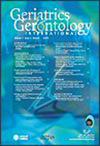Novel predictors of infection-related rehospitalization in older patients with heart failure in Japan
Abstract
Aim
Rehospitalization of patients with heart failure (HF) incurs high health care costs and increased mortality. Infection-related rehospitalizations in patients with HF occur frequently, and the risk increases with age. This study aimed to identify the factors associated with infection-related rehospitalizations in older patients with HF.
Methods
Demographic, clinical, and pharmacological data from 1061 patients with acute HF who were enrolled in the Kochi Registry of Subjects With Acute Decompensated Heart Failure (Kochi YOSACOI study) were analyzed. Additionally, a machine learning approach was applied in addition to the traditional statistical analysis model. Of the patients hospitalized for HF, 729 were ultimately analyzed.
Results
During the 2-year postdischarge follow-up period, 121 (17%) patients were readmitted for infections. Logistic regression analysis identified a Japanese Cardiovascular Health Study (J-CHS) score of ≥3 (odds ratio, 1.83 [95% confidence interval, 1.18–2.83]; P = 0.007) at discharge as a key factor for infection-related rehospitalizations. Machine learning models confirmed that a higher J-CHS score and lower estimated glomerular filtration rate (eGFR) increased the risk of infection-related rehospitalizations. Decision tree analysis classified the risk into high (J-CHS score ≥3), medium (J-CHS score <3; eGFR ≤35.0) and low (J-CHS score <3; eGFR >35.0) groups.
Conclusions
Infection-related rehospitalizations occur in older patients with HF and are associated with frailty and eGFR. These findings provide valuable insights for health care providers to better manage the risk of infection-related rehospitalizations in older patients with HF, potentially improving patient outcomes. Geriatr Gerontol Int 2025; 25: 543–552.


 求助内容:
求助内容: 应助结果提醒方式:
应助结果提醒方式:


